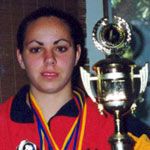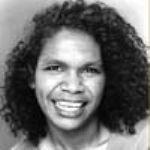
When you think about the Olympic sport of wrestling, the image of big hairy men in red leotards grunting at each other in Russian is what usually comes to mind. Thankfully, 17-year-old champion freestyle wrestler Suellyn Hayes couldn’t be further from that stereotype!
A three-time Australian gold medallist, Suellyn was the 2001 national schoolgirl champion, as well as the schoolgirl and junior champion for South Australia. And at last year’s 8th National Aboriginal & Torres Strait Islander Sports Awards, she nabbed the coveted Junior Sportswoman of the Year award.
“It was deadly winning that award,” says Suellyn. “I feel very honoured and very proud to be recognised by my own people. It’s the best award I’ve ever received!”
Suellyn was born in Dandenong, Victoria in 1984, but moved to Adelaide with her family when she was four. Attending Christies Beach High School there, Suellyn was introduced to wrestling at the age of 13 and has been subjecting opponents to her killer five-point throw ever since.
Now living in the suburb of Morphett Vale, Suellyn is halfway through her Certificate 4 in Aboriginal Management at Onkaparinga TAFE. She has also landed a 12-month traineeship at the local library, however her career plan is to pursue a career in sport and recreation (she has a Level 1 Coaching Certificate in Wrestling).
Suellyn trains at Flinders University Wrestling Club for two and a half hours, three times a week, where she is coached by freestyle supremo Luba Hofr and 2000 Olympian Arek Olzack. Her training schedule is pretty frantic at the moment, as she’s in preparation for the Australian Junior and Senior Championships to be held on 23 and 24 February at the Sutherland PCYC in Sydney.
If she wins in Sydney, Suellyn can look forward to competing at the Oceania Championships later in the year. Currently wrestling in the 62kg weight division, she will have to slim down to the Olympic weight division of 55kg for the Oceanias.
The 2004 Olympic Games in Athens will see the introduction of female wrestling, something that Suellyn is understandably very excited about.
“To compete in the 2004 Olympics is my long term goal, but right now I’m concentrating on winning in Sydney in February and going on to the Oceanias. Every fight from hereon in counts towards getting selected for the Olympics.”
Suellyn has already competed on the world stage at the 2001 World Wrestling Championships in Martigny, Switzerland. She received a lot of attention from competitors, coaches and spectators alike for her gutsy performances against some of the world’s best junior wrestlers.
“When I went to the championships I was all by myself,” she recalls. “I had to meet up with a couple from New Zealand in Kuala Lumpur who were staying at the same hotel as me. That was scary because I had never met them before!”
Competing overseas is an expensive undertaking for Suellyn. Because wrestling is not a hugely popular sport in Australia, it can be difficult to attract sponsorship. However she has been awarded a scholarship from the Australian Sports Commission’s Indigenous Sports Program.
Suellyn has the full support of her family and friends. “They encouraged me from day one, it’s been really good,” she says. She is also inspired by her heroes people like Anthony Mundine, Evonne Goolagong and Cathy Freeman. “What Cathy has done for Aboriginal sport is just too deadly!”
President of the South Australian Amateur Wrestling Association, David Schumacher an Olympic veteran from the 1956 Melbourne Games says he has great hopes for Suellyn.
“She trains every day whether it’s wrestling or just running on the beach. With such total commitment and dedication I think she has the potential to win a medal in 2004. All she needs is more competition so that she can compete every week. At the moment she’s beating everyone in both juniors and seniors!.
While the smoke-and-mirrors entertainment of American professional wrestling is pure spectacle designed for television, true wrestling is an ancient sport that was practised in Egypt and Mesopotamia more than 5,000 years ago. It then developed to become one of the main sports at the Olympic Games in ancient Greece, and images of famous wrestlers can be found on old coins and pottery from that era.
“There are a lot of people out there that think Olympic-style wrestling is just like the WWF wrestling you see on television, but it is totally different, says David. “For a start there is no way you can get hurt. Rather, it’s all about pinning your opponent to the floor.”
Suellyn has this to say to any young people thinking about taking up wrestling: “Always keep at it and don’t worry about what people think. If you want to do it, then do it! Set bigger and bigger goals and you can accomplish anything.”
end
When you think about the Olympic sport of wrestling, the image of big hairy men in red leotards grunting at each other in Russian is what usually comes to mind. Thankfully, 17-year-old champion freestyle wrestler Suellyn Hayes couldn’t be further from that stereotype!
A three-time Australian gold medallist, Suellyn was the 2001 national schoolgirl champion, as well as the schoolgirl and junior champion for South Australia. And at last year’s 8th National Aboriginal & Torres Strait Islander Sports Awards, she nabbed the coveted Junior Sportswoman of the Year award.
“It was deadly winning that award,” says Suellyn. “I feel very honoured and very proud to be recognised by my own people. It’s the best award I’ve ever received!”
Suellyn was born in Dandenong, Victoria in 1984, but moved to Adelaide with her family when she was four. Attending Christies Beach High School there, Suellyn was introduced to wrestling at the age of 13 and has been subjecting opponents to her killer five-point throw ever since.
Now living in the suburb of Morphett Vale, Suellyn is halfway through her Certificate 4 in Aboriginal Management at Onkaparinga TAFE. She has also landed a 12-month traineeship at the local library, however her career plan is to pursue a career in sport and recreation (she has a Level 1 Coaching Certificate in Wrestling).
Suellyn trains at Flinders University Wrestling Club for two and a half hours, three times a week, where she is coached by freestyle supremo Luba Hofr and 2000 Olympian Arek Olzack. Her training schedule is pretty frantic at the moment, as she’s in preparation for the Australian Junior and Senior Championships to be held on 23 and 24 February at the Sutherland PCYC in Sydney.
If she wins in Sydney, Suellyn can look forward to competing at the Oceania Championships later in the year. Currently wrestling in the 62kg weight division, she will have to slim down to the Olympic weight division of 55kg for the Oceanias.
The 2004 Olympic Games in Athens will see the introduction of female wrestling, something that Suellyn is understandably very excited about.
“To compete in the 2004 Olympics is my long term goal, but right now I’m concentrating on winning in Sydney in February and going on to the Oceanias. Every fight from hereon in counts towards getting selected for the Olympics.”
Suellyn has already competed on the world stage at the 2001 World Wrestling Championships in Martigny, Switzerland. She received a lot of attention from competitors, coaches and spectators alike for her gutsy performances against some of the world’s best junior wrestlers.
“When I went to the championships I was all by myself,” she recalls. “I had to meet up with a couple from New Zealand in Kuala Lumpur who were staying at the same hotel as me. That was scary because I had never met them before!”
Competing overseas is an expensive undertaking for Suellyn. Because wrestling is not a hugely popular sport in Australia, it can be difficult to attract sponsorship. However she has been awarded a scholarship from the Australian Sports Commission’s Indigenous Sports Program.
Suellyn has the full support of her family and friends. “They encouraged me from day one, it’s been really good,” she says. She is also inspired by her heroes “” people like Anthony Mundine, Evonne Goolagong and Cathy Freeman. “What Cathy has done for Aboriginal sport is just too deadly!”
President of the South Australian Amateur Wrestling Association, David Schumacher “” an Olympic veteran from the 1956 Melbourne Games “” says he has great hopes for Suellyn.
“She trains every day whether it’s wrestling or just running on the beach. With such total commitment and dedication I think she has the potential to win a medal in 2004. All she needs is more competition so that she can compete every week. At the moment she’s beating everyone in both juniors and seniors!”
While the smoke-and-mirrors entertainment of American professional wrestling is pure spectacle designed for television, true wrestling is an ancient sport that was practised in Egypt and Mesopotamia more than 5,000 years ago. It then developed to become one of the main sports at the Olympic Games in ancient Greece, and images of famous wrestlers can be found on old coins and pottery from that era.
“There are a lot of people out there that think Olympic-style wrestling is just like the WWF wrestling you see on television, but it is totally different,” says David. “For a start there is no way you can get hurt. Rather, it’s all about pinning your opponent to the floor.”
Suellyn has this to say to any young people thinking about taking up wrestling: “Always keep at it and don’t worry about what people think. If you want to do it, then do it! Set bigger and bigger goals and you can accomplish anything.”




Comments are closed.